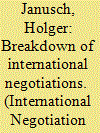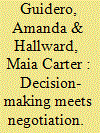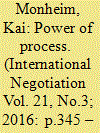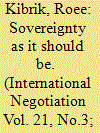|
|
|
Sort Order |
|
|
|
Items / Page
|
|
|
|
|
|
|
| Srl | Item |
| 1 |
ID:
148546


|
|
|
|
|
| Summary/Abstract |
This article examines whether the two-level game can theoretically explain negotiation breakdowns without referring to uncertainty alone. For this purpose, social conflicts are integrated in the two-level game. In this light, the classical hypothesis that smaller win-sets increase the risk of a negotiation breakdown can no longer be maintained. Instead, conflict intensity – and thereby the risk of breakdown – correlates with the intersection of the win-sets in the form of an inverted U-curve. It follows that negotiations are most likely to break down when the intersection of the win-sets is perceived as medium-sized, because the bargaining space and thereby the potential of conflict intensity is largest/highest. Furthermore, the insertion of social conflicts into the equation runs counter to the hypothesis that issue linkages facilitate international cooperation. On the contrary, issue linkages increase the risk that goal conflicts, in particular, intensify each other by spreading from one issue to another.
|
|
|
|
|
|
|
|
|
|
|
|
|
|
|
|
| 2 |
ID:
148543


|
|
|
|
|
| Summary/Abstract |
The Israeli-Palestinian conflict attracts much scholarly and diplomatic attention. However, despite Secretary of State John Kerry’s determination during the 2014 round of negotiations, the parties are no closer to reaching a negotiated agreement over twenty years after the signing of the Oslo Accords. This article explores an under-examined aspect of negotiation, the decision to enter into talks, using poliheuristic theory. We examine the decision-making calculus of Palestinian president Mahmoud Abbas in his bid for Palestinian statehood at the United Nations, a decision to not negotiate. We ask not only why did Abbas choose to bypass US-mediated negotiations, but why he chose to pursue Palestinian statehood at the UN. In our analysis and discussion, we identify gaps in the existing decision-making and negotiation literatures and ways to better incorporate questions of power asymmetry and the complexity of context into poliheuristic theory.
|
|
|
|
|
|
|
|
|
|
|
|
|
|
|
|
| 3 |
ID:
148541


|
|
|
|
|
| Summary/Abstract |
Management of a multilateral negotiation has frequently played a crucial role in developing global regimes but is often ignored in International Relations theory. The long-awaited UN climate summit in Copenhagen, for example, broke down in 2009 but negotiations reached agreement one year later in Cancún. This article argues that power and interests remained largely constant between Copenhagen and Cancún, and that significantly altered negotiation management by the host government and the UN explains much of the difference. An analytical framework is presented to address whether and how the management of a multilateral negotiation by the organizers increases or decreases the probability of agreement. The empirical focus is on the Danish and Mexican Presidencies of climate negotiations, with extensive evidence from participant observation and 55 interviews with senior negotiators, high-level UN officials, and lead organizers. The argument adds to the scholarship on regime development by complementing structural with process analysis.
|
|
|
|
|
|
|
|
|
|
|
|
|
|
|
|
| 4 |
ID:
148542


|
|
|
|
|
| Summary/Abstract |
Private peace entrepreneurs (PPEs) are private citizens with no official authority who initiate diplomatic correspondence with official representatives from the opposing side during a conflict in order to promote conflict resolution. This article outlines a theoretical framework for analyzing this phenomenon, drawing on a wide range of case studies. It defines the phenomenon and analyzes the power resources and factors that help the PPE influence official processes. The article shows that although PPEs lack official authority and legal status, they have alternative, unofficial resources that help them influence the diplomatic sphere, and some have even played critical roles in conflict resolution efforts. The analysis distinguishes among different means of influence – through official decision makers, public opinion, the rival side, or a third side. The article offers insights about the individual private citizen as an actor in peace diplomacy and describes important historical figures who were excluded from history textbooks.
|
|
|
|
|
|
|
|
|
|
|
|
|
|
|
|
| 5 |
ID:
148544


|
|
|
|
|
| Summary/Abstract |
This study suggests that one of the basic elements motivating political actors is their desire to minimize the tension caused by the theoretical gap between their theoretical knowledge and their perception of reality. In order to demonstrate this, the present study compares three different arenas of negotiations which reveal and represent the social construction of the concept of sovereignty: the peace agreement between Israel and Egypt (1979), the peace agreement between Israel and Jordan (1994), and the Oslo agreements between Israel and the PLO (1993–1995). The comparison herein demonstrates how the need to deal with the theoretical gap can explain the sides’ behavior in reaching an agreement. Likewise, the comparison reveals that the concept of sovereignty has destabilized over the course of time. It also shows how political actors in these arenas chose to cope with the theoretical gap – mainly by changing reality – although the destabilization of the concept of sovereignty allowed them to be more creative, theoretically speaking, in the context of globalization processes.
|
|
|
|
|
|
|
|
|
|
|
|
|
|
|
|
| 6 |
ID:
148545


|
|
|
|
|
| Summary/Abstract |
What factors explain the brinkmanship and threats of Greece’s distributive tactics over the third bailout package in 2015? Examining negotiations between Greece and its creditors during SYRIZA’s (Coalition of the Radical Left) tenure in power, I argue that the Greek government’s strong ideological fervor turned the bailout negotiations into an ideologically based dispute, which involved “sacred” value biases and uncompromising posturing. Unable to form cooperative transnational coalitions, Athens increasingly turned to distributive bargaining tactics that antagonized creditors and escalated the conflict. The article highlights how values act as barriers in bailouts and has implications for the study of intergovernmental negotiations in the European Union.
|
|
|
|
|
|
|
|
|
|
|
|
|
|
|
|
|
|
|
|
|